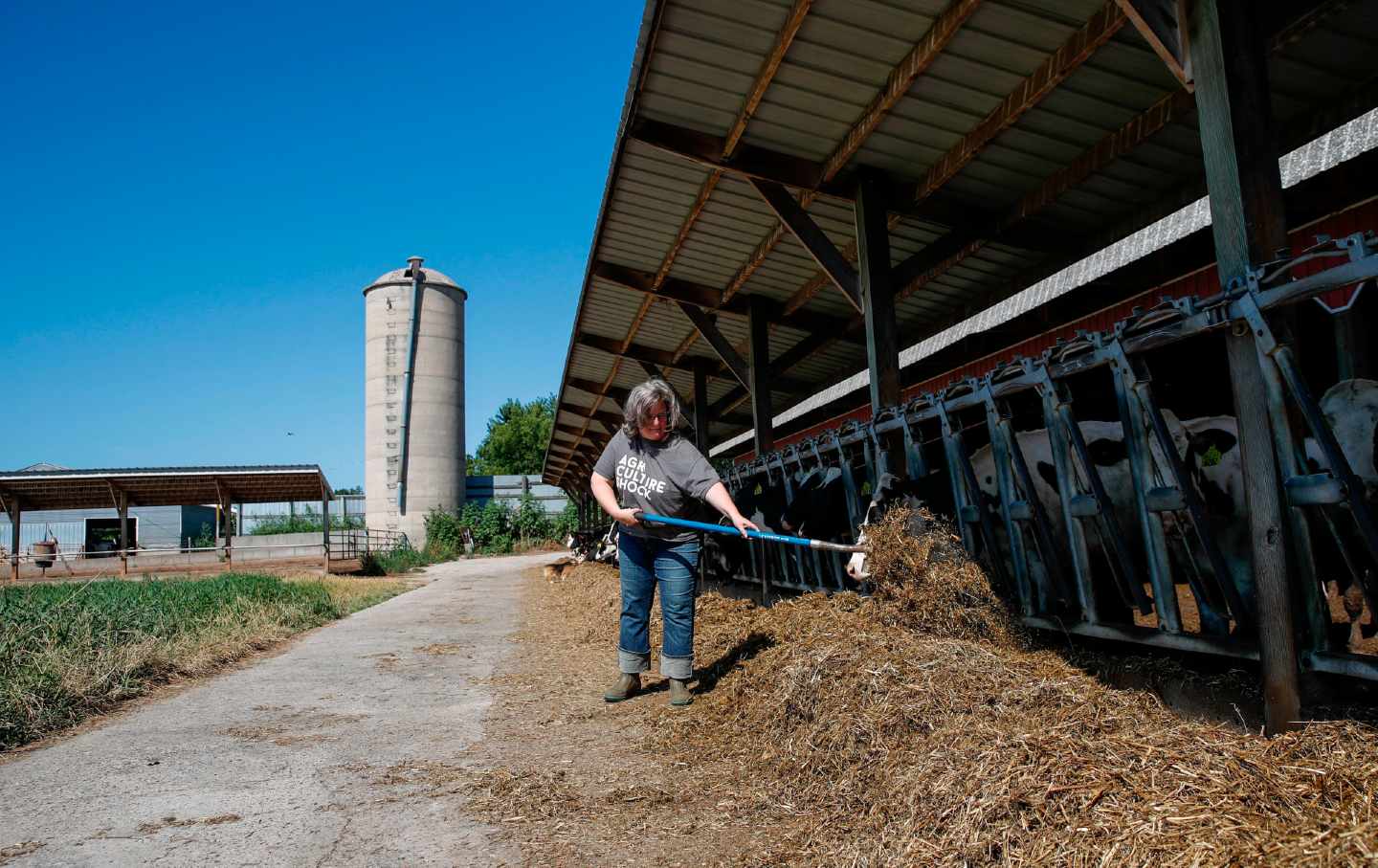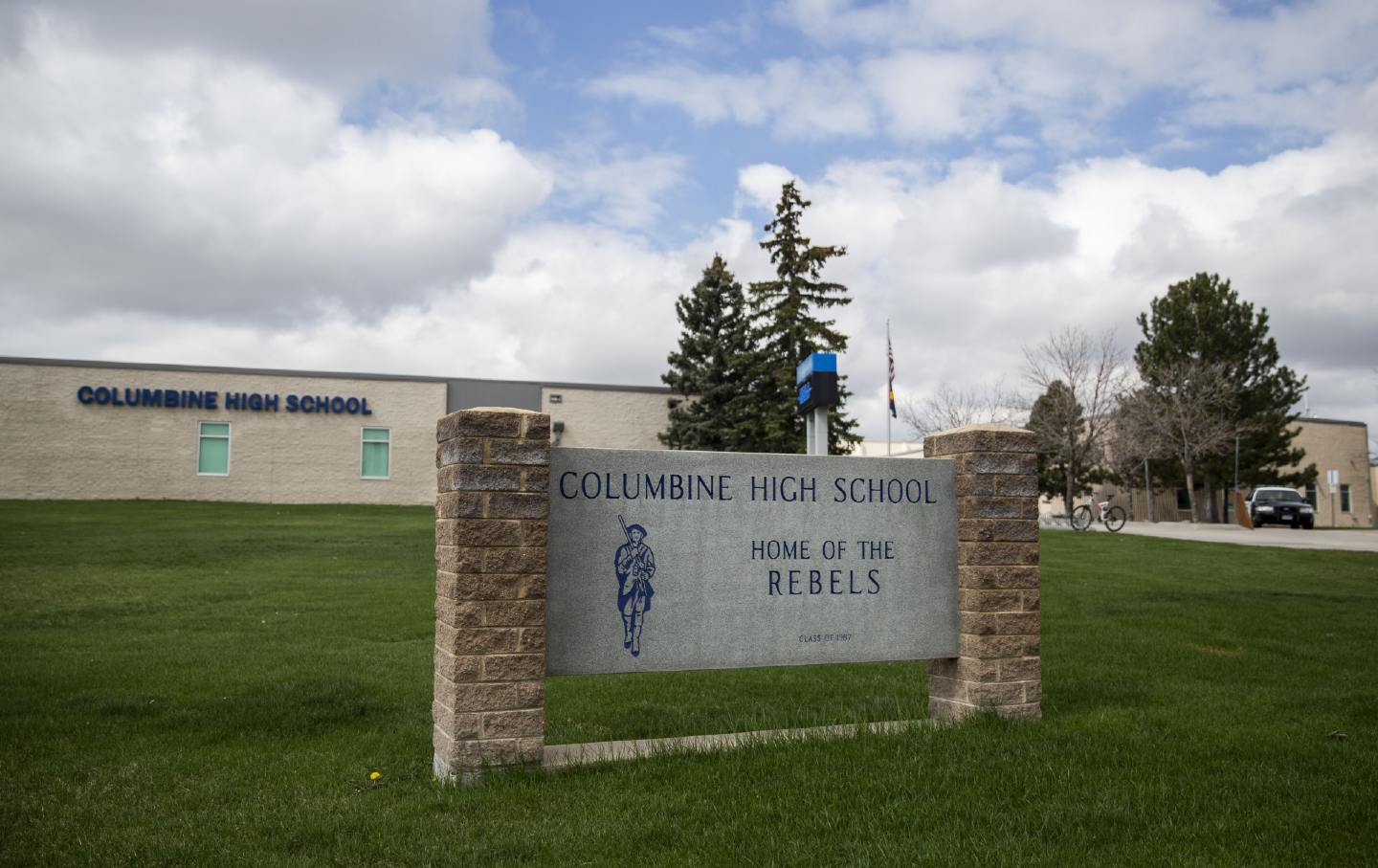Republican Overreach on Abortion Could Be the Party’s Downfall in November
In key swing states, ballot measures protecting reproductive rights may drive turnout in favor of Democrats.

Demonstrators during a Women’s March rally at the Arizona State Capitol in Phoenix, AZ, in January 2024.
(Caitlin O'Hara / Bloomberg)Tuesday’s twin rulings on abortion from the Florida Supreme Court—one letting a deeply restrictive, DeSantis-backed anti-abortion law go into effect, the other permitting an abortion-access initiative, Amendment 4, on the November ballot—have upended political certainties in the Sunshine State. Last week, no one was talking about Florida as a swing state; now, with abortion at center stage, it’s not beyond the bounds of the possible that, with an overwhelming majority of Floridians—including a majority of Republicans—in favor of reestablishing abortion rights protections, the Democrats will be able to use this issue to drive a wave of supporters to the polls in November.
For the Democrats, who continue to face a barrage of bad presidential election polling data, including a recent Wall Street Journal poll showing Donald Trump ahead in all the 2020 swing states bar Wisconsin, putting Florida into play would mark the first time in this election season that they have played offense.
It would, indeed, be a delicious irony if DeSantis’s hubris in pushing through a six-week abortion ban opposed by the vast majority of his state’s residents proved to be Donald Trump and Senator Rick Scott’s undoing in Florida this November.
Yet such is the state of disarray in the Florida Democratic Party that, even with the huge assist the Supreme Court has given them by turning abortion into the central issue of the upcoming vote in Florida, it remains a long shot for President Joe Biden to mount a successful challenge for the state’s Electoral College votes.
At the other end of the Sunshine Belt, however, a very different dynamic holds. In Arizona, Trump is currently polling ahead of Biden, but the state GOP is in total disarray. In January, the party chair resigned after being recorded trying to bribe Kari Lake to exit the race for the GOP Senate nomination. And last week, Lake declined to defend herself in a defamation lawsuit brought against her by Stephen Richer, the Republican Maricopa County recorder, who she alleged had intervened in the election count to prevent her from claiming victory in the 2022 governor’s race.
Arizona’s 11 votes are likely to be crucial in the jigsaw puzzle that is the modern Electoral College. In fact, given Biden’s lackluster polling in Georgia, and the fair likelihood that that state will revert to its Republican norm, a loss in Arizona would mean that Biden has to sweep all of the remaining swing states from 2020. A win in Arizona, by contrast, gives him an added degree of security, canceling out, for example, the potential loss of Michigan if large numbers of young and/or Arab American voters choose to sit out the election in protest of the administration’s ongoing arming of the Israeli military and the continued war in Gaza.
Like Florida, Arizona is being riven by political battles over abortion. The procedure is currently legal in Arizona until the 15th week of pregnancy, but anti-abortion activists have been making a concerted legal push to force the state to enforce an 1864 law banning abortion in all circumstances, including rape and incest, except when the mother’s life is in danger.
Kari Lake and other leading GOP figures in the state realize they’re on a road to nowhere with such extreme proposals, and, despite Lake’s previous support for banning abortion pills, they have in recent months distanced themselves from the effort to impose a near-total abortion ban.
Yet the legal efforts by hard-line anti-abortion activists have mobilized progressives in the state to push for a ballot measure, like Florida’s Amendment 4, to protect abortion access.
This week, Arizona for Abortion Access announced that it had gathered more than half a million signatures to place a ballot measure before voters in November, far more than the 383,923 needed. Since many signatures get disqualified during the verification process, the coalition is taking nothing for granted and will continue to gather signatures in the remaining three months before the deadline. But it’s now a virtual certainty that the coalition will end up with enough verified signatures to qualify the ballot effort, which would lock into place a “fundamental right” for Arizonans to have an abortion until the point of fetal viability.
In late 2022, a large-scale state-by-state survey of attitudes on abortion by the Public Religion Research Institute found that 62 percent of Arizona voters supported keeping abortion legal and easily accessible. Polling last year found that an abortion-protection initiative could measurably boost Democratic turnout in the state and also make infrequent voters more likely to come out and vote.
Activists in Nevada, too, another potentially crucial swing state likely to be decided by a few tens of thousands of votes, are on the verge of qualifying an initiative that would codify in the state Constitution the right to an abortion up until the 24th week of pregnancy.
As the election nears, these abortion ballots, in Florida, Arizona, Nevada, and elsewhere are going to become increasingly important. With Biden’s coalition more fragile than it was in 2020, this could yet prove to be the issue that saves the country from the horrors of a second Trump presidency.
Thank you for reading The Nation!
We hope you enjoyed the story you just read. It’s just one of many examples of incisive, deeply-reported journalism we publish—journalism that shifts the needle on important issues, uncovers malfeasance and corruption, and uplifts voices and perspectives that often go unheard in mainstream media. For nearly 160 years, The Nation has spoken truth to power and shone a light on issues that would otherwise be swept under the rug.
In a critical election year as well as a time of media austerity, independent journalism needs your continued support. The best way to do this is with a recurring donation. This month, we are asking readers like you who value truth and democracy to step up and support The Nation with a monthly contribution. We call these monthly donors Sustainers, a small but mighty group of supporters who ensure our team of writers, editors, and fact-checkers have the resources they need to report on breaking news, investigative feature stories that often take weeks or months to report, and much more.
There’s a lot to talk about in the coming months, from the presidential election and Supreme Court battles to the fight for bodily autonomy. We’ll cover all these issues and more, but this is only made possible with support from sustaining donors. Donate today—any amount you can spare each month is appreciated, even just the price of a cup of coffee.
The Nation does not bow to the interests of a corporate owner or advertisers—we answer only to readers like you who make our work possible. Set up a recurring donation today and ensure we can continue to hold the powerful accountable.
Thank you for your generosity.
More from The Nation

Here’s What a 21st-Century Rural New Deal Looks Like Here’s What a 21st-Century Rural New Deal Looks Like
A strategy for building a rural-urban working-class coalition.

The House Foreign Aid Bills Have Put a Target on Mike Johnson’s Back The House Foreign Aid Bills Have Put a Target on Mike Johnson’s Back
After a vote in favor of sending $95 billion to Ukraine, Israel, and Taiwan passed, far right Republicans are threatening a motion to vacate the speaker of the house.

Is Donald Trump on Drugs? If Not, He Should Be. Is Donald Trump on Drugs? If Not, He Should Be.
His true addiction explains the president’s doziness.

It Just Might Be That Democrats Know How to Win Michigan It Just Might Be That Democrats Know How to Win Michigan
A pair of special-election landslides proves that the party is doing something right.

25 Years After the Columbine Massacre, Is There Any Hope to End America’s Epidemic of Gun Violence? 25 Years After the Columbine Massacre, Is There Any Hope to End America’s Epidemic of Gun Violence?
With the National Rifle Association now weaker than it has been in decades, progress is possible—if politicians are willing to seize the time.

Bob Graham Knew Iraq Would Be a Quagmire Even as Most Democrats Fell for Cheney’s Lies Bob Graham Knew Iraq Would Be a Quagmire Even as Most Democrats Fell for Cheney’s Lies
The former Senate Intelligence Committee chair saw through Republican efforts to manipulate Congress into authorizing a war that should never have been fought.


